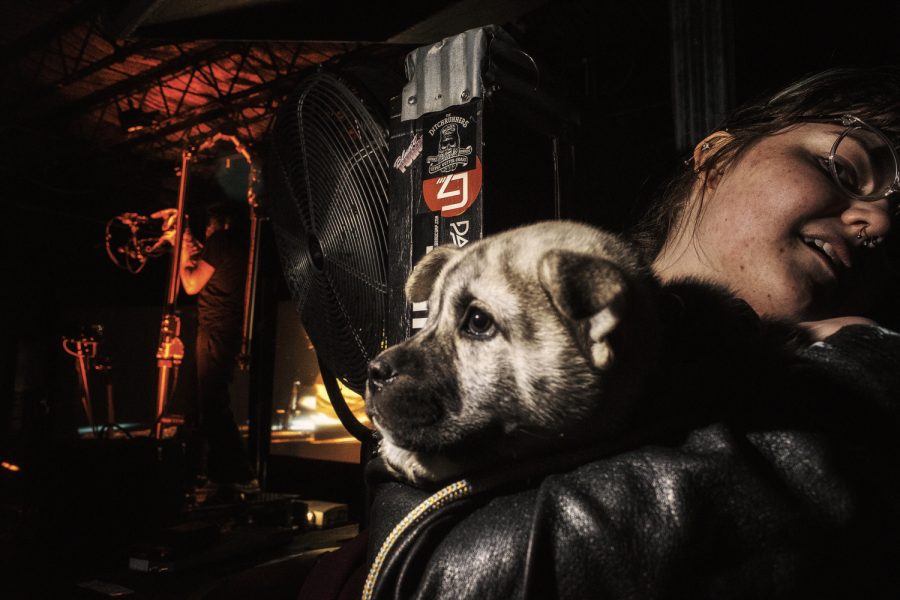Opinion: Having a dog is worth the added responsibility for college students
Although taking care of a pet can be difficult, both financially and socially, the benefits for students outweigh the hardships.
Artemis the dog makes a brief appearance to see That1Guy perform at Gabe’s on Friday, Feb. 16, 2017. That1Guy designed and built this one of a kind instrument which draws on his experience as a classically trained double bass player. Apart from his instrument, he is known for his odd sense of humor and a eccentric live performances.
September 25, 2019
Dogs are man’s best friend, and they can be an enjoyable addition to any household. Like most people, I am a dog lover and have been for my entire life. When I lived at home, my family always had at least one dog, so when I came to college there was a certain emptiness that I found in losing the ability to be around my pet 24/7.
When my parents suggested that I take care of our family dog for a few weeks this semester, I was thrilled. However, I have learned over the past week with my dog that being a pet owner in college is much more responsibility than I had previously assumed.
For students deciding to adopt or bring a dog to college, there are several things to consider when making the decision, including time management.
Students at the University of Iowa with a full schedule are usually taking 15 credit hours or more. In addition to extracurriculars and social obligations, a regular day can end up requiring several hours being spent away from your apartment. When thinking about owning a dog, especially a puppy, it should be noted that they require constant attention and bathroom breaks. Being able to decide whether you are flexible enough to incorporate these daily trips home into your schedule is important to gauge before becoming a pet owner.
Katelyn Ekstrom is a UI senior and adopted her dog Moose last year. She says that although she wouldn’t change anything, having a dog in college has caused aspects of her social life to change.
“I think having a dog can be difficult in college because you can’t just leave your apartment and not think about how long you’re going to be gone,” Ekstrom said.
Another factor to consider before bringing your pooch to campus is the financial responsibility involved.
According to RaisingSpot.com, the yearly cost of having a dog can range from $360 to $2,520 or more. This supplement of expenses can add up to being about what a student at the University of Iowa would pay for a semester of classes or a few months of rent. On top of this, most housing complexes charge tenants that have a dog a monthly fee. However, there are exceptions to this added expense if your pet is a registered emotional-support or therapy animal.
If the idea of shelling out extra money and making lifestyle changes for your pet to live with you doesn’t seem too extreme, it is significant to mention that having a dog can be beneficial to improving the overall quality of life in college.
Elyssa Lavigne is a recent graduate from UI and said that adopting her dog, Herky, was the best decision that she had ever made.
“Although my priorities had to change after getting my dog, he made me so much happier, and I got through college because of him,” Lavigne said.
Living in an apartment or housing complex where other tenants also have pets can be a great way to meet new people and get more involved in your community. When I take my dog for walks, I am usually stopped by at least one person who wants to pet her which can end up leading to making new friends.
In addition to this, I also find that coming home to a warm welcome from a dog is enough to make even my worst day a smidge better.
The everyday stress that me and other college students endure can be burdensome and I, but having a pet seems to decrease that level of anxiety.
It is no secret that there is a great amount of responsibility that comes with being a pet owner in college; however, with that added commitment comes the endless advantages of living with your furry companion.
Columns reflect the opinions of the authors and are not necessarily those of the Editorial Board, The Daily Iowan, or other organizations in which the author may be involved.





